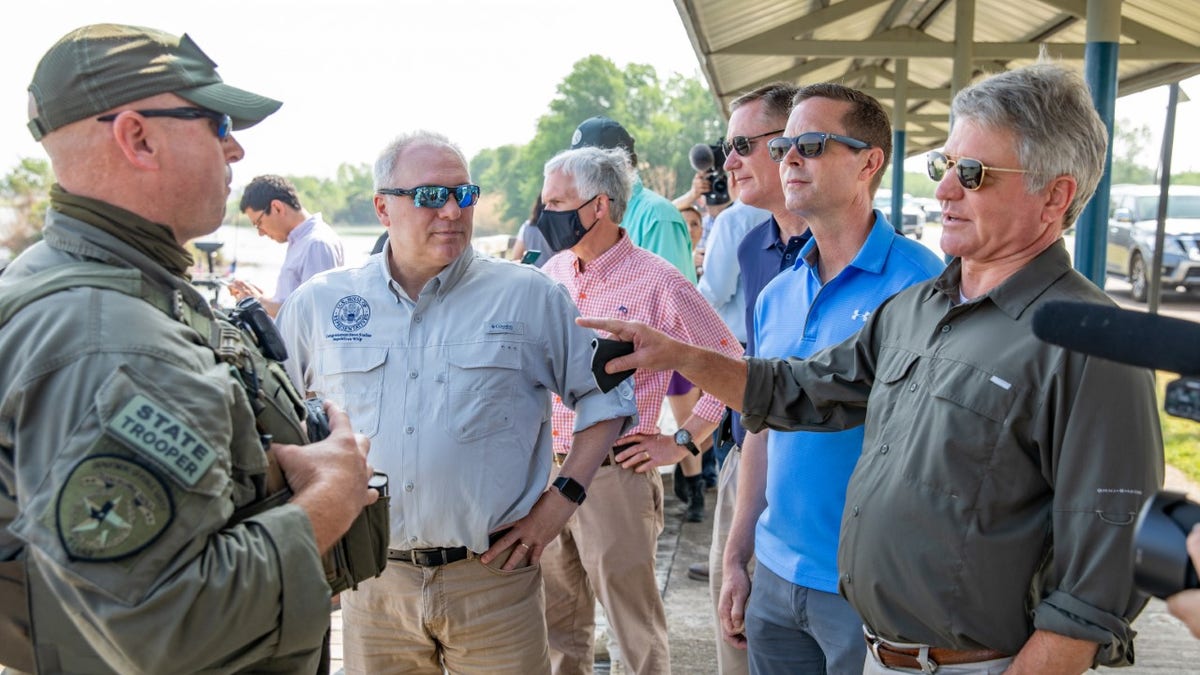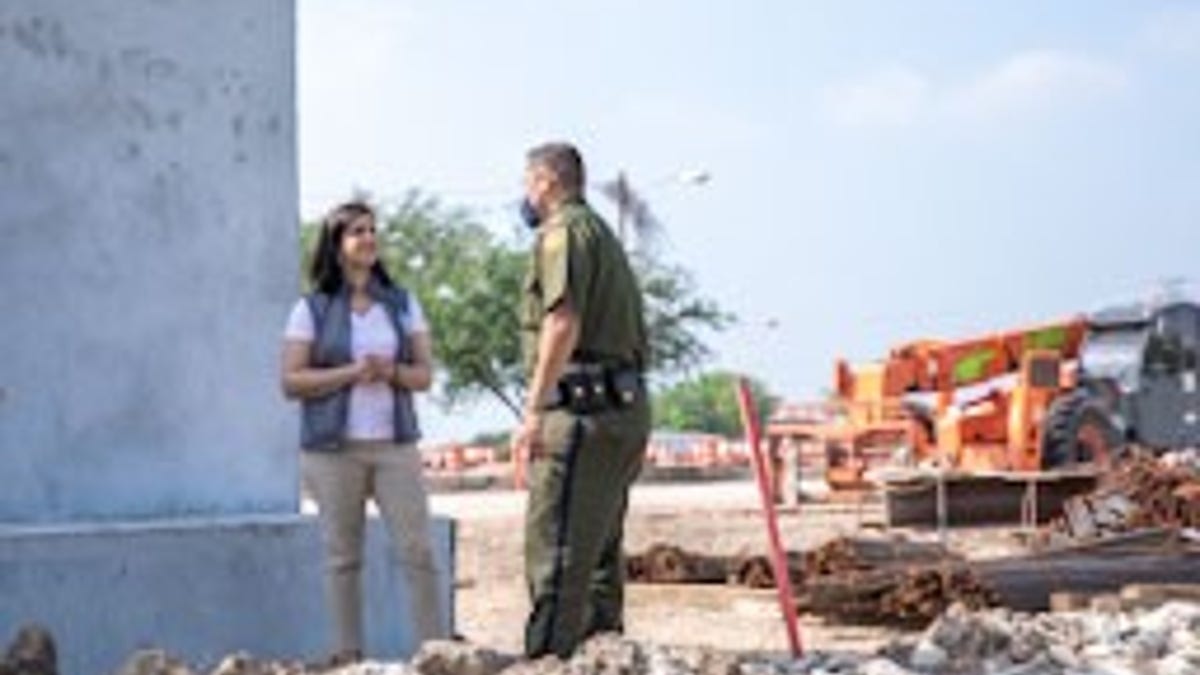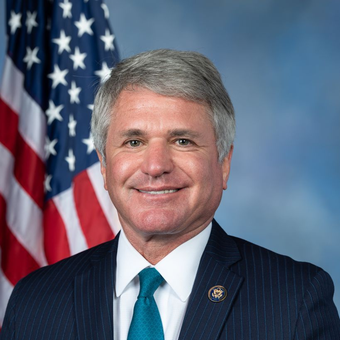Southern border encounters remain at 20-year high
Del Rio Sector Chief Patrol Agent on more than 20,900 unaccompanied minors are in U.S. custody.
Last month, we had the opportunity to visit our southern border and see this migrant crisis firsthand. While we were there, we saw a 5-year-old girl all alone. She was in tears – not knowing where she is or where her family may have gone.
Children were crammed into overcrowded facilities, huddled on the hard ground with only a silver, solar blanket to keep warm. Ten percent of the children were COVID-positive. Everywhere we looked, we saw children who were, quite simply put, traumatized.

Rep. Michael McCaul (right) speaks to Border Patrol agents at the Rio Grande Valley in Texas. (Courtesy of Office of Republican Whip Steve Scalise)
The Customs and Border Protection agents informed us that they are overworked, underfunded and demoralized. They are being out resourced and distracted by human traffickers and drug cartels who exploit these children and their families.
So, whether President Biden wants to say it or not, we have an ongoing crisis at our southern border – and it is only getting worse.
A heartbreaking humanitarian crisis.
CLICK HERE TO SIGN UP FOR OUR OPINION NEWSLETTER
And worse – it’s a crisis that could have been prevented.
But, with the stroke of a pen the Biden administration rescinded the Migration Protection Protocols with Mexico and the asylum cooperation agreements with El Salvador, Guatemala and Honduras. Negotiated by President Trump, this effective framework pushed back against traffickers and removed incentives for illegal immigration.
More from Opinion
- Sen. Marsha Blackburn: Biden can end our border crisis. My plan will kick start the solution
- Liz Peek: Biden's inflation risks – recovery isn't president's priority. Instead, this comes first for Dems
- Dr. Nicole Saphier: COVID-19 and America – the state of emergency is over and it's time to declare it
When we spoke with the Border Patrol, they told us this wasn’t just a seasonal surge, as the Biden administration is attempting to claim. They said there is a direct link between reversing these agreements and this border crisis.
While we need to address the immediate crisis at the border, we also need a comprehensive strategy to address the root causes of migration from this region. Otherwise, we will continue to face these crises in the future.
That starts with looking at the three biggest challenges in the region: lack of economic opportunity, ineffective governance and corruption, and drug-related violence.
Biden’s plan to send an additional $4 billion in aid is not the solution to any of these issues. Yes, assistance to the region is needed, but we must ensure it supports a realistic strategy capable of addressing the drivers of migration and delivering long-term improvements.
Sustained progress in the region means a commitment to addressing corruption and promoting the rule of law.
Rather than throwing billions of American taxpayer dollars at the problem, we encourage the Biden administration to start with the Development Finance Corp. (DFC). The DFC is a public-private partnership that uses the might of the U.S. government backed by the money from private companies to create jobs and high-quality financing in developing countries around the world. It already provides a strong alternative to the Chinese Communist Party’s predatory economic practices in the region and is robust tool to counter their influence.
Yet it has the potential to do so much more. By helping to create opportunities for businesses in the region to grow, the DFC could reduce risks and maximize opportunities in the region.

Rep. Nicole Malliotakis at the border along Texas' Rio Grande Valley. (Courtesy of Office of Republican Whip Steve Scalise)
Promoting prosperity, however, will be difficult without addressing the region’s violence, rampant corruption and drug challenges. The region is regretfully located between the top drug-producing countries in South America and primary drug consumers in North America. Destabilizing drug violence and corrupt governance contribute to migrants fleeing their home countries in pursuit of opportunity and safety.
Recent efforts by Mexico’s President Andres Manuel Lopez Obrador to weaken our counter drug efforts will only exacerbate this problem. By undermining our shared ability to target drug cartels that operate throughout Latin America, the region will be less safe and secure.
We must strengthen our partners' law enforcement capabilities so they can better interdict drugs and secure their streets and borders from organized crime.
Weak government institutions extend beyond the security sector, impacting economic performance and the region’s ability to fulfill its citizens basic needs. At times, corrupt officials capitalize on institutional weakness at the expense of vulnerable Central Americans.
CLICK HERE TO GET THE FOX NEWS APP
Sustained progress in the region means a commitment to addressing corruption and promoting the rule of law. We must empower the region’s criminal justice institutions and ensure they’re free from politicization and criminality.
Our neighbors in Central America deserve the opportunity to succeed in their home countries and live in secure, stable conditions. And by helping them with targeted assistance that fosters economic growth, good governance and security, we can minimize future border crises.
CLICK HERE TO READ MORE BY REP. MIKE MCCAUL
Republican Rep. Nicole Malliotakis represents New York's 11th Congressional District.










































